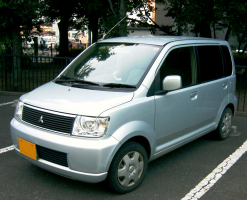— Mitsubishi Motors president Tetsuro Aikawa has admitted his company intentionally falsified data about fuel economy on more than 600,000 vehicles sold in Japan.
Mr. Aikawa said tire pressure readings were falsified to make the fuel economy appear better than it was, although he said he was unaware of what was taking place.
Nearly 470,000 of the vehicles were manufactured by Mitsubishi for Nissan and it was Nissan who discovered the problems. The remaining 157,000 vehicles were sold directly by Mitsubishi.
The faulty fuel economy figures affect minicars with 660cc gasoline engines, including the Nissan Dayz, Mitsubishi eK Space and eK Wagon. Mitsubishi says it doesn't believe cars outside of Japan are affected by the falsified data but that has yet to be determined.
The automaker says evidence points to faulty tire pressure readings as causing the cars to seem 10 percent more fuel efficient than they are. The admission of guilt means Mitsubishi may be required to reimburse government tax rebates the minicars received based on fuel economy estimates.
Mr. Aikawa admitted the company has been testing its cars incorrectly since 2002 in a way that wasn't legal according to Japanese standards. It's another blow to the automaker that had to borrow money more than 10 years ago to make it through an ordeal caused by dangerous defects covered up by Mitsubishi. The defects involved axle problems so severe the wheels could fall off the cars.
"Since the cover-up of recalls in the 2000s, we have tried to reinforce compliance within the company, but a compliance sense still hasn't penetrated to every employee. I deeply understand how difficult it is to strengthen compliance, and I think this is a very shameful issue." - Tetsuro Aikawa
Word of the news caused a drop of 15 percent in Mitsubishi shares.
Mitsubishi joins a long line of automakers who have faced the music after getting caught manipulating and concealing data.
The ongoing saga of Volkswagen and its fraudulent emissions tests is still in the news weekly, as is Takata, the airbag manufacturer that has caused millions of recalls and at least 10 deaths in the U.S.
In addition, General Motors hid ignition switch defects for 10 years while the defects were killing and injuring hundreds of people.
Hyundai and Kia lost almost $400 million in December 2013 after agreeing to reimburse owners over inflated mileage claims. Then in 2014, the U.S. Environmental Protection Agency fined Hyundai and Kia $350 million for giving consumers false information about real-world fuel economy values.
Ford also found itself in trouble in 2014 when it agreed to pay 200,000 hybrid car owners up to $1,050 each as a "goodwill payment" based on faulty mileage claims.

